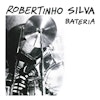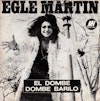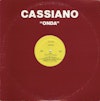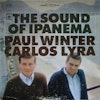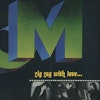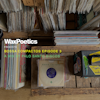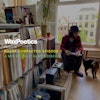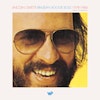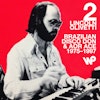Rogê and Tommy Brenneck want music lovers from Pasadena to Rio de Janeiro, and everywhere in between, to experience and enjoy the product of their unique alchemy, a mixing of their respective styles: timeless Rio de Janeiro samba with classic analog soul, but in the end, these two veteran musicians needed to make Curyman for their own deeply personal reasons. This record is the first album Rogê recorded in Los Angeles, his family’s home as of 2019, and it’s the first album released on Diamond West Records, the label Brenneck launched in 2022 after moving to Los Angeles with his family in 2017.
Rogê and Tommy are both in their forties and regarded highly by their peers in their respective scenes, having played music professionally since their teens. Old souls with youthful energy, they still feel like they have a lot to prove. Rogê, born Roger José Cury, is a native of Rio de Janeiro, and student of the fiercely competitive samba school tradition. Tommy Brenneck, who was given the nickname “TNT” from the Queen of modern soul music, Sharon Jones, grew up in Staten Island, New York, on a steady diet of golden-era hip-hop, psychedelic rock, and gritty old-school funk, joining the Daptone movement before any of them believed there could be a career in making meticulously crafted analog soul music. Before being introduced by a mutual friend, Rogê didn’t know Brenneck’s music or reputation, and vice-versa.
Before Rogê had the chance to play Tommy his demos, which he’d painstakingly recorded with (everyone’s favorite Brazilian American record producer, Mario Caldato Jr. aka) Mario C., Tommy played him some tracks from a recent project, Molly Lewis’s Forgotten Edge EP. According to Tommy, Rogê “had never heard production that sounded like what I was doing, and I was really blown away by the dude’s musicianship. I was like, ‘This guy is a fuckin’ monster on the guitar!’ It was like fucking love at first sight.” After hearing only two songs, Tommy set up mics and recorded twelve of Rogê’s songs, eight of which ended up on Curyman a year and a half later.

Born and raised in Arpoador, a tiny neighborhood sometimes claimed by the more famous neighborhoods on either side, Ipanema and Copacabana, Rogê is carioca (slang for Rio natives) to the core. “My spirit is from there. My soul is from there, the music, the way that I’m talking. There are a lot of kinds of sambas, but the sambas that I make are very Rio de Janeiro.” Attracted to the vibrant live samba scene in neighborhoods like Lapa, Rogê began writing songs and honing his craft in samba circles and at carnival rehearsals, and eventually earned the respect and partnership of top tier sambistas like his friend, mentor, and frequent songwriting partner Arlindo Cruz. Eventually, Rogê landed a coveted residency at Carioca da Gema, Lapa’s premier samba club, becoming a fixture there for the next ten years.
“Sometimes you can become too local,” Rogê reflects from backstage at the Lodgeroom in L.A. following the first full-band performance of the Curyman material in November of 2022. Despite six solo albums, a live DVD, a Latin Grammy nomination, and cowriting the 2016 Olympics theme song, Rogê tells me that “somewhere in my mind I was thinking, there’s something more.” The combination of escalating violence in his hometown, the election of the far-Right Trump-style president Jair Bolsonaro in 2018, and wanting to provide a brighter future for his wife and two children led Rogê to conclude it was time to move north. He was also encouraged by a couple Brazilians who split their time between Rio and L.A: Seu Jorge and Mario C., the latter of whom’s house Rogê crashed at for a couple months while working on demos for a possible solo album. Seu Jorge, who Rogê knew since the ’90s, invited him to record a duet album in 2019 for the U.K.-based Night Dreamer label. The duo’s twenty-three-show tour got cut short after two performances due to the pandemic, robbing audiences of a chance to experience Rogê onstage, where he’s most comfortable and charismatic.
Following the back-to-back deaths of Sharon Jones and Charles Bradley in 2016 and 2017, respectively, Tommy faced an extended existential crisis. After “discovering” Bradley hiding in plain site as an occasional handyman around the Daptone headquarters and part-time James Brown impersonator, Tommy encouraged, coached, and championed Bradley all the way to the Apollo and around the world, becoming one of the greatest soul singers and transcendent performers the storied genre has yet to produce. In 2017, Tommy somewhat reluctantly accepted the offer (upon the insistence of his California-raised wife) from frequent collaborator and hitmaker Mark Ronson to assist him in running the legendary L.A. recording studio, the Sound Factory. “The New Yorker in me was like, ‘Fuuuuuuuuuuck,’” Tommy recalls about making the leap from East to West Coast, but it was obvious to him and his wife, they needed a change.
Even though he knew he’d never find another Charles Bradley or Sharon Jones, Tommy kept looking fruitlessly until a chance meeting with Rogê forced him to reimagine his next musical move. Recognizing Rogê’s magnetic musicality immediately, Tommy instinctively urged the Brazilian to explore the intersection of traditional samba and classic soul. “I didn’t put any music out for a couple of years, so this Brazilian thing, if anything, was a way for me to launch a new label with something I was completely passionate about,” Tommy explains from the nearly completed build-out of the Diamond West studio, his first West Coast studio, located in Pasadena, California.

At first listen, Curyman is a radical departure from Tommy’s best-known productions, which are grounded in analog soul music styles and informed by the swagger and boom-bap of golden-era hip-hop. “Just like Afrobeat is soul and Jamaican music is soul, I think Rogê’s music is soul music—I don’t know what the fuck else it is?” Referencing the giants of the ’70s Brazilian soul zenith, Jorge Ben and Tim Maia, Tommy asserts that, “We’re kinda picking it up from there, and I’m not gonna say we can do it better… I mean, definitely not better than Jorge Ben, but that is the territory that we’re exploring.”braz
Musically, they each brought crucial elements to the equation. Building off Rogê’s compositions (all but two songs), Tommy handled the production and hand-picked the rhythm section (BadBadNotGood’s Chester Hansen on bass and Abe Rounds on drums), while Rogê brought in Sergio Mendes’s percussionist, Gibi dos Santos, to seal the Rio deal. “There was this element of Brazil and soul coming together in the studio,” Tommy describes, “and that was really fun working out the songs, because we wanted to keep it really rootsy, but when there was a chance to add a soulful element to it, we jumped on that opportunity.”
In 2023, a union of samba and soul music is by no means original, but what is unique is that a multinational band recorded songs in Los Angeles that could pass for undiscovered samba soul 7-inches from the ’70s. Combining Rogê’s infectiously rhythmic guitar playing and staccato singing with Abe and Chester’s deep-pocket rhythms, the band approaches the high-water mark of Jorge Ben’s best recordings from the early ’70s. This is no mistake, as Rogê spent decades mastering this style. “In Brazil, I play this kind of music a lot, and some people think that I’m the guy that will continue this style,” he says, citing his mentors Serginho Meriti and Bebeto who typify the samba rock sub-genre pioneered by Jorge Ben’s mix of samba, blues, and soul music strains.
“I recorded for many producers in Brazil, but he’s very rare, unique,” Rogê says about Tommy. “Because he has balls; he has courage to not feel insecure about the little things, because he really knows what he wants.” After recording the whole album live to tape over the course of three days, Tommy daydreamt out loud about how cool it would be to get Arthur Verocai to add string arrangements, to which Rogê responded: “He’s my friend, he’s my brother—I can call him and make a Facetime!” The next week, they flew down to Rio to work on arrangements with Maestro Verocai, arranger for Tim Maia and Jorge Ben, as well as the artist behind one of the greatest Brazilian albums of all-time, his eponymous 1972 album.
Across eleven songs, Rogê explores an impressive range of Brazilian musical styles beyond the samba-soul sounds heard on “Eu Gosto Dela,” and the album’s standout track, “Existe Uma Voz.” On “Pra Vida” and “Mistério da Raça,” Verocai’s strings layer gorgeous melodies over Rogê’s rhythmic strumming and plaintive vocals. Rogê’s intricate and sensitive guitarwork shine on “Nação Tupi,” “Retumbar Do Meu Tambor,” and “Camará,” the latter displaying Baden Powell–level furious finger-work. Slightly pinched and raspy, Rogê’s vocals adjust to a variety of settings, shifting between rapid-fire rhythmic recitation on one song to romantic crooning on the next, like on the maudlin bossa nova blues of “Se Eu For Falar Do Amor,” which might win the close competition for best Verocai arrangement on the album.
The production wanders into slightly psychedelic dimensions on “Grito do Natureza,” hinting at a promising direction for Rogê and Tommy to explore on the next album, which they talk about in excited tones. “We both want to do more psychedelic shit, but the [Curyman] songs were really beautiful and traditional,” Tommy says excitedly. “He covered a lot of territory, and we couldn’t do some psychedelic shit just to do it,” he says, adding with a mischievous twinkle in his eye, “We have to earn it.”
Just as the recording process that produced Curyman challenged Rogê to rethink his music for an audience beyond his hometown, this project also forced Tommy to rethink his musical process. “It was really exciting for me to produce a record totally out of my depth,” he admits, as a casual fan of Brazilian music at the time of the recording. “It allowed me to really hear the production, and I wasn’t a musician—I did end up playing on the sessions, but not a lot—and I wasn’t composing.” Since wrapping the album, the duo continue to influence each other musically. Tommy invited Rogê on the road to open for Budos Band, and Rogê’s introduced Tommy to his favorite Brazilian artists, from Baden Powell and Vincius de Moraes’s Os Afro Sambas to Milton Nascimento and Luiz Bonfá. “I got way into it after we made the record,” Tommy explains of his newfound obsession with Brazilian music. Studying the guitar with Rogê, he gained a deeper appreciation for the music. “It’s really sophisticated music compared to the soul music I’ve been doing for my whole career, and having him—who’s the general article—fucking teach me that music on guitar was a cool relationship to have.”
Given the breadth of styles the greater Daptone family’s fucked with for over twenty-plus years, it’s hard to believe there’s never been a release explicitly inspired by Brazil or involving Brazilian musicians. “None of us were tapped into the Brazilian community in New York,” Tommy says. “It was a random meeting with a Brazilian and being blown away by his musicianship and songwriting that brought it into the family.” Not that it couldn’t have happened in New York, but there’s definitely a Brazilian wave happening in Los Angeles during the past few years with Jazz Is Dead championing Brazilian legends on record and for some historic live concerts (Verocai, for example), as wall as other Los Angeles–based tastemaking labels Stones Throw and Innovative Leisure releasing albums by Brazilian artists in 2023. “This feels like a natural place for me to start a label and come out with a Brazilian soul record that fits in the Daptone/Truth & Soul/Big Crown world that I’ve been part of for twenty years.”
